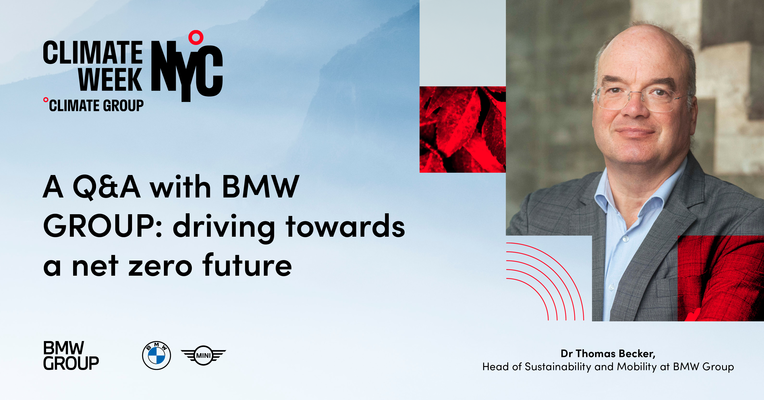We recently sat down with Dr. Thomas Becker, VP Sustainability and Mobility Strategy at BMW Group, to talk about innovative approaches and commitment to reducing carbon footprint within the automotive industry.
What actions are you taking now to cut your carbon footprint?
We know that the future of our business and the future of our planet are intrinsically linked, and we are constantly seeking new ways to cut emissions. An obvious and important step is the shift to electrification, however that alone won’t solve the car industry’s environmental impact and emissions problem. It’s widely known that producing electric vehicles requires a lot of resources and CO2-intensive processing, therefore car manufacturers must look at the entire lifecycle of both new and existing vehicles to truly take action on emissions.
A manufacturer’s commitment to combatting the climate crisis can best be gauged by looking how it manages and prioritises the sustainability of a vehicle’s lifecycle, including its production and upstream supply chains. We are not only reducing the use of primary materials and prioritising the use of recycled materials in our cars, but also taking responsibility for the emissions associated with the manufacturing of our cars.
As a company, BMW Group is part of the Business Ambition for 1.5°C and the United Nations’ Race to Zero, ensuring we’re responsible for our part in meeting the commitments set out in the Paris Agreement.
To make sure we’re on track for meeting our net zero commitments we’re looking at new and pioneering ways to reduce our carbon footprint from EVs, to hydrogen to recycled materials, and by 2030 we will achieve at 40% reduction in CO2 emissions for the lifecycle of all our vehicles.
What are some of the challenges you are facing globally in decarbonising your business?
One of the greatest challenges for BMW Group, and all major manufacturers, is addressing Scope 3 emissions – those caused by our wider value chain, rather than just our own operations. By 2030, our aim is to cut such carbon emissions by 20% compared with 2019 levels.
The supply chain and lifecycle of a car is long and complex, so cutting these emissions involves addressing emissions arising from: the sourcing of materials including the mining of metals and minerals for raw materials and components; the energy-intense processing of raw-materials, the entire manufacturing process; each car’s driving phase; and the recycling of vehicles at the end of their use.
We don’t yet have all the answers and there’s no doubt that decarbonising all this in the urgent time frame required is a major task, but we are determined and understand our responsibility and role in making it happen.
How are you ensuring that you are reducing emissions across your supply chains, as well as your own operations?
As a global car manufacturer, we have a complex international supply chain and a responsibility to reduce its impact. We are working closely with our suppliers worldwide to help them cut their emissions as a central part of our emissions reduction approach. We integrate CO2-saving measures and secondary material rates into supplier contracts. In some cases, we are stopping work with suppliers that aren’t meeting our agreed requirements.
The transition to renewable energy will play a key role in reducing both our own emissions and those arising from our supply chain. Over 50% of our supply chains’ 2030 CO2 reduction targets will be met solely by switching to low carbon power sources. Over 500 of our suppliers have contractually signed up to this.
And by the way we have been first movers in integrating sustainability into our corporate report, thus applying the exact same level of transparency and scrutiny to the sustainability as to the financial dimension of what we do.
What role does innovation play in your company's efforts to address climate change?
Innovation is at the heart of everything we do – especially our sustainability strategy. As a premium manufacturer, we are rising to the task of designing new, innovative solutions and turning them into everyday reality.
Most significantly, from 2025 onwards our NEUE KLASSE electric vehicles will set new standards, with a new generation of battery and a trailblazing approach to using recycled parts. It will include a new concept that will allow us to tailor-make batteries to fit any model, as well as recently developed component recycling techniques.
New powertrain technology such as hydrogen – alongside electrification – will also play a role in helping us as an organisation, and industry, address climate change. The BMW Group is committed to technology transparency, without it the industry won’t achieve its net zero goals. With over 40 years of experience with hydrogen technology and more than 20 years in hydrogen fuel cell technology, we are in a leading position to share our expertise to drive positive change throughout the industry.
